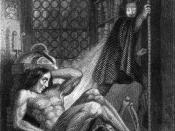Frankenstein, a novel by Mary Shelley was published in 1818. Shelley's novel contains arguments on ideas such as human feelings and her feelings on the Enlightenment. There are many critics that have there on arguments on the novel as well. My feelings on this novel reflect both the arguments of the critics and Mary Shelley.
The first idea is that man or woman naturally needs love and compassion. People will go to any limit to succeed in their need for love. Shelley shows this point when Victor refuses the monster after he sees what he has created. In turn, feeling rejected, the monster vows to find a way to gain companionship. This does not seem to be the big message of the book but is a very important idea Shelley seems to argue throughout the novel.
Although, when you look at what the monster has done in more depth, what seems to be Shelley's major argument becomes more apparent.
She argues that extreme intelligence and curiosity leads to evil. She does this by using the previous example of the construction of the monster. When first constructing the monster Victor takes his time in bringing the monster to life. As the story goes on Shelley shows how this reason slowly overwhelms Victor as he begins to stay up to early in the morning so he can finish constructing the monster. Through Victor's intelligence and reason he finally creates this evil creature. The monster's murders show the evil that Victor has made through his reasoning. Shelley does not like the idea of the scholars reasoning philosophy at the time and portrays her own ideas of what can happen through the reasoning that man has now discovered. What makes this argument so interesting is that Shelley was presenting this idea around the time of the Enlightenment.
Not all critics feel that Shelley is trying to make these points though. In 1818 the British Critic published this: ""æthese volumes have neither principle, object, or moral"æ"ÃÂ. There is some controversy to this review of the book because the writer of the article knew that the author was a woman. He also stated, ""æthe fact that a woman being the author is a prevailing fault of the novel."àObviously he had some feelings toward women making, what seems to me, a huge statement about men and reason. In 1827, Sir Walter Scott's essay was published. He seemed to think that Shelley's novel focused more on the feelings and passion of mankind rather than the more in depth idea involving the Enlightenment.
Personally, I thought this book was very good. I did dislike the fact that Shelley was arguing that intelligence or scientific knowledge led to evil. This is somewhat true, but it seems to me that Shelley is trying to say that it is always fact. I don't agree that knowledge leads to evil all the time. In my perspective I see many drugs that have been invented and saved thousands of lives. I don't see how this is evil. This is one of the major things I disagree with. On the other hand, knowledge has led to things such as cloning. Cloning can be looked at as the same as the creation of the monster. I believe this is what Shelley was trying to lead to but took it a little too far to my taste. I did like how Shelley showed the monsters feelings. I think its wonderful that this was in the book and very important for people to realize what peoples emotions can lead to. I feel a lot of times people don't realize that people need some attention. If someone is abandoned, such as the monster, then it can lead to such things as murder or suicide. Even if the effects are not that dramatic severe depression can be a symptom.
No matter who's reading the novel or how in depth in may be taken it still offers several life lessons. For example, no matter the person, one should still be treated as a human. Some critics read it another way than Shelley may have originally planned. Frankenstein is still a good book which lots can be learned from.





